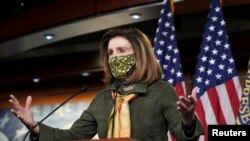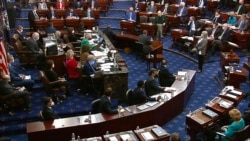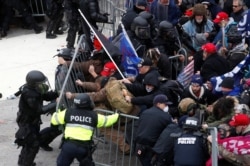U.S. House Speaker Nancy Pelosi has called for a commission to investigate the January 6 attack on the U.S. Capitol, the latest in a long line of independent panels appointed by lawmakers and U.S. presidents to examine moments of national crisis as well as policy issues.
Blue-ribbon commissions take on different forms and are typically defined by legislation that specifies such details as the membership, scope of what is to be examined, budget and what the final product should be. The panels often are asked to produce recommendations on how to improve a system or, in the case of a disaster, avoid a similar occurrence in the future.
Pelosi said the new commission would be similar to one convened after the September 11, 2001, terrorist attacks on New York and Washington — one of the most searing events in the nation’s recent history.
In a letter to congressional colleagues, the speaker wrote that an independent, outside panel would “investigate and report on the facts and causes relating to the January 6, 2021, domestic terrorist attack upon the United States Capitol Complex.”
She said it would examine issues “relating to the interference with the peaceful transfer of power, including facts and causes relating to the preparedness and response of the United States Capitol Police and other Federal, State, and local law enforcement in the National Capitol Region."
The Senate voted on Saturday to acquit former President Donald Trump on an impeachment charge of inciting a mob to attack the Capitol on January 6 as Congress was certifying Trump’s loss to Democrat Joe Biden in the November 3 presidential election.
While the House managers who prosecuted the case against Trump presented dramatic videotape footage of the bloody attack that left five people dead and scores seriously injured, there were many questions left unanswered about what led up to the attack and the role of Trump and others before, during and after the incident.
Thomas Schwartz, a professor of history at Vanderbilt University, said such commissions are not uncommon.
“Congress has actually appointed more than 100 of these commissions over the last 10 years on all sorts of problems, some quite minor comparatively,” Schwartz told VOA. “There was one, of course, on the 9/11 attacks, but there have been others on, for example, the opioid crisis.”
Schwartz said the commissions are designed oftentimes “to enlist expertise from outside of Congress, as well as attempt to get a politically bipartisan effort to either investigate something or to get a policy recommendation.”
A report from the nonpartisan Congressional Research Service identified additional benefits to the commissions, including that they allow for complex issues to be studied longer, and in more depth than members of Congress can do themselves. Trump’s Senate impeachment trial — the second of his presidency — concluded after only five days on February 13 and didn’t involve the calling of witnesses.
Moreover, by making the commissions nonpartisan or bipartisan, the findings and recommendations can be more politically acceptable to Congress and the public.
But Schwartz said that while commissions such as the one convened after September 11 do have significant impact and results, there are many cases in which the findings are not appealing or acceptable to those in power.
Schwartz recalled a famous case in the late 1960s when President Lyndon B. Johnson appointed a commission headed by former Illinois governor Otto Kerner to investigate the causes of urban riots that killed 43 people in Detroit and 26 in Newark and led to widespread urban disturbances elsewhere.
The final report of the National Advisory Commission on Civil Disorders “came back with a rather harsh conclusion about the presence of racism in American society,” Schwartz said.
He said Johnson “basically ignored it, ignored a lot of its findings, so it's not an uncommon thing for these commissions to be sort of ignored if they come back with conclusions that are uncomfortable.”
The 9/11 Commission, officially called the National Commission on Terrorist Attacks Upon the United States, was convened in November 2002 and tasked with providing a full account of the country’s preparedness and response to the terrorist attacks on the World Trade Center and the Pentagon by al-Qaeda airline hijackers, as well as providing recommendations to guard against future attacks.
The report released by the 10-member panel in 2004 said the attacks “were a shock, but they should not have come as a surprise.”
“What we can say with confidence is that none of the measures adopted by the U.S. government from 1998 to 2001 disturbed or even delayed the progress of the al-Qaeda plot. Across the government, there were failures of imagination, policy, capabilities, and management,” the report said.
The commission’s 41 recommendations sparked a number of major reforms, including the creation of a director of national intelligence, tightened land border screenings, and crackdowns on terrorist financing.
Another prominent commission was established in the early 1980s when President Ronald Reagan and Congress appointed the National Commission on Social Security Reform, led by economist Alan Greenspan, to find ways to ensure the program’s solvency.
“There were significant changes made through amendments to the Social Security Act as a result of the Greenspan commission, including incrementally increasing the retirement age, for example, from 65 to 67,” Capri Cafaro, executive-in-residence at American University School of Public Affairs, told VOA.
“Those are some of the more well-known examples of bipartisan commissions that were tasked with trying to figure out essentially the underlying causes of the problem that they are tasked to examine, to be able to figure out what kind of solutions can be offered to remedy the issue going forward.”
Not all commissions have led to concrete actions. President George W. Bush created another bipartisan commission to look at the Social Security system in 2001 but its findings — which concluded among other things that the system would be strengthened by including voluntary personal accounts — did not have enough support in Congress to become policy.
In 2010, President Barack Obama set up a bipartisan commission on federal debt reduction. But after seven months there was not enough agreement among the members to approve the commission’s report and send its recommendations for congressional consideration.
Schwartz said in terms of public support, commissions have been successful when they are seen as “fair-minded and nonpartisan,” though that could be harder to achieve in a time of political polarization.
“If they are perceived as having tried to get at the truth, they could have an effect on public memory and public understanding of the event,” Schwartz said.
Regarding public desire for a commission to investigate the January 6 insurrection at the Capitol, Cafaro said she thinks people want answers to the question, “How could this possibly happen?”
“I think there's a lot of people that can't believe and don't understand how something like that can happen to the U.S. Capitol,” Cafaro said. “There are a lot of questions to be asked on what happened with the Capitol Police, what happened with the National Guard, is there a necessity for changes in jurisdictional issues of law enforcement surrounding the U.S. Capitol, does there need to be enhanced cooperation.”
“There's all kinds of things that need to be addressed to go forward,” Cafaro said.
(Jesusemen Oni contributed to this story.)






